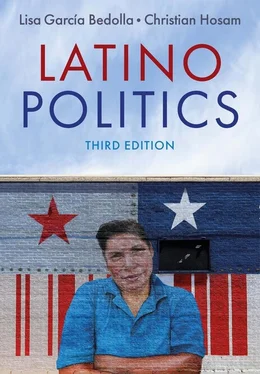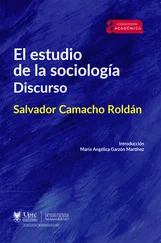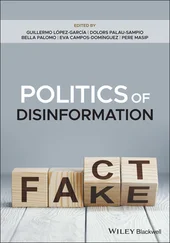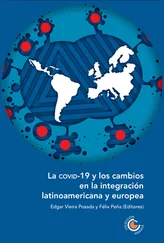This book is a labor of love, with equal emphasis on both labor and love. I have been gratified to have had this opportunity but, in taking it on, I never fully accounted for the time and effort it would take to get it to the finish line. Where the love comes in is all of the people who cheered me on and supported me in big ways and small, and encouraged me to advocate for myself and learn to tell myself “no” to increasing demands on my time.
First and foremost, I have to thank Lisa García Bedolla for the opportunity to work on this project. As an early-stage graduate student, I was excited and enthused about the chance to write this book, but mostly stunned that she asked me. The imposter syndrome I felt came out as confusion. I literally sat in her office and asked: “Why me?” Working with her has shown me how to balance multiple demands, start a project from scratch, and remain rooted in communities outside of academia. She has been a constant supporter, mentor, and collaborator on this project and others (all while being a wife, mother, professor, and Dean), and I am extremely grateful that she felt compelled to take me under her wing as she has.
Being a young scholar in training, the way you progress is by finding people to model yourself after. Luckily, I’ve been blessed with a wealth of mentors and advisors who have been generous with their time, advice, and grace. Leonardo Arriola, Desmond Jagmohan, Didi Kuo, Joel Middleton, Cecilia Mo, G. Cristina Mora, Tianna Paschel, Eric Schickler, Janelle Wong, and many others whom I have not named here have all been critical in their own ways, for which I am so grateful. Thanks go to Marcia Chatelain for being a confidant, mentor, and someone who is always right on time with a kind word and cup of tea. Special thanks go to Taeku Lee for being a wonderful advisor who provides me with so many opportunities and has constantly had my back during my graduate school journey. I make sure to run all my biggest academic risks (this book being the biggest so far) by him before I make a final decision.
Thank you to Ann Glusker and Natalia Estrada at the UC Berkeley Doe Library for their awesome work in helping find datasets and information about various chapters in the book. They truly helped us refine our gauge for deciding whether a hunch was a dead end or something that needed to be pursued further.
That I have also had such a tremendous set of colleagues to go through graduate school with has made this process far smoother than I had any right to hope for. My first-year cohort has been wonderful in setting norms about self-care that allow us to be more open about the struggles that we all face, which has, in a fortunate turn of events, made it a much more productive environment to work in. So many of the graduate students and assistant professors in my orbit have become my friends, with whom I can share professional and personal struggles, many of which came up during the writing of this book. Matt Brundage, Tara Chandra, Sonya Chen, Jordie Davies, Justine Davis, Norris Davis, Jake Grumbach, Jane Henderson, Jenn Jackson, Andrew McCall, Vanessa Navarro Rodriguez, Stephanie Peng, Réuben Pérez, Clara Perez-Medina, Bhumi Purohit, Diane Wong, and Jae Yeon Kim have all provided such wonderful and necessary support systems.
Jaime Sánchez, Joel Rhone, and Kelsey Henry all started graduate school a year before I did and seeing their successes gave me confidence that I made the right career choice, and their work and friendship continues to sustain me even now. For Jaime especially – who is destined, among other things, to be an important scholar of Latino politics in his own right – having his thoughts and perspectives in the back of my mind as I was writing kept me grounded to the stakes and rigor of the work.
My friends force me to take my head out of the books sometimes and keep a clear focus on the world around me. This kind of love, insight, and steady stream of laughter is my anchor through my professional life and makes me a better scholar and person by reminding me that my life is more than the measure of what I produce in the ivory tower. Chipper Bounds, Emma Coleman, Talia Derogatis, Rajaa Elidrissi, Faith Hibbert, Penelope and Brodie Hosam, Kevin Hutchinson, Andrea Kelly, Evelyn Kim, Reinette Kirton, Kamla Kumar, Tenzin C. Kyisarh, Elizabeth Litvitskiy, Jenny Muñiz, Cleo Nicole Okai, Maimouna Siby, Clive Smith, Jeffrey Smith, Ammie Tea, Arpita Vora, Quinn Wong, Catherine Wulff, and many others give me the kind of life-sustenance that we all need, and I am humbled to have been blessed to receive it from such a rollicking and wonderful cast of characters.
Finally, to my mother, Cheryl Hosam. She passed away in 2016 after a short bout with cancer, and the aftershocks of that loss are still with me today and will be with me for ever. But the sadness is undercut by the pride that I can take in how palpable her influence is in everything I do. A Trinidadian immigrant who worked multiple jobs but had a passion for reading and a razor-sharp insight into politics, her imprint is in everything I do. I miss her every day and this project, just like all the others, is inspired and shaped by her in ways big and small, explicit and subtle. Mom: I hope I honor you with this work, all my work, and with my life.
1 Introduction: Latinos and US Politics
Objectives
To understand the difference between Latino cultural and political acceptance in the United States
To clarify the definitions of agency and structure
To examine what it means for race to be a social construction and the political, social, and economic implications of how Latinos were categorized racially
To explore the historical meaning and privileges that have been attached to whiteness in the United States
To evaluate how Latinos fit (or not) into the US racial structure
Latinos, Cultural Representations, and Politics
The 2020 Super Bowl Halftime Show featured music icons Jennifer López and Shakira. Singing in both English and Spanish, the two women celebrated their place within the Latino diaspora by singing a multicultural mix of pop, reggaeton, and R&B to make fans move. After presenting a symbolic representation of children in cages (one of which included López’ daughter singing a ballad), López wrapped herself in a feather cape that featured the US flag on one side and the Puerto Rican flag on the other. This high-energy embrace and celebration of Latino culture, bilingualism, and biculturalism, which was seen by millions, was especially powerful given the current political moment in the United States, one where Latino immigration and Latino communities have been framed as detrimental to the US way of life. 1The Halftime Show spoke to an apparent contradiction in how Americans see Latinos culturally versus politically. Culturally, salsa has been the most popular US condiment (beating ketchup) since 1992. 2Similarly, tortillas regularly out-sell hamburger or hot dog buns, and tortilla chips are more popular than potato chips. 3Luis Fonsi’s song “Despacito,” after being remixed and featuring Justin Bieber, but still including mostly Spanish lyrics, was number one in Billboard’s Hot 100 for 16 weeks, tying it for the longest run atop the Billboard charts. 4Similarly, in 2018, Cardi B and Bad Bunny’s “I Like It,” also sung mostly in Spanish, hit number one in Billboard’s Hot 100. 5
Yet this apparent embrace of Latino cultural representations – discussed here in reference to food and music but not limited to those things – points to a contradiction between cultural acceptance and political life. Hate crimes against Latinos are on the rise in the United States and public rhetoric around Latino immigration and immigrants has become significantly more racialized. Just one example from a 2019 tweet from President Donald Trump:
Читать дальше












